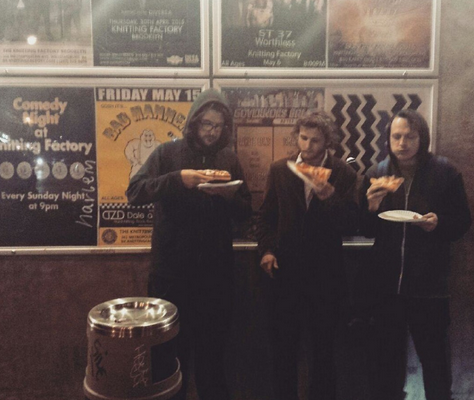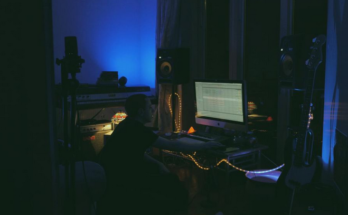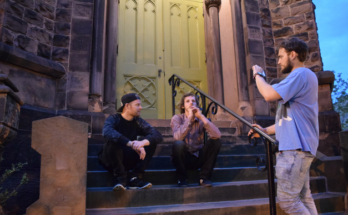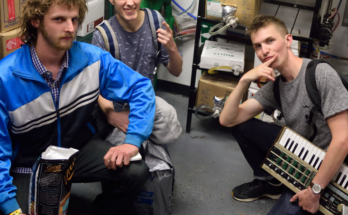EC- Let me get my notes up here…
Mr. Bill- (Laughing)
EC- What?
MB- Oh, nothing, you just remind me of that kid from Almost Famous.
EC- I resent that.
MB- But, why?
EC- It’s a gross oversimplification of what I do, and makes me feel like a naive little tag-a-long.
MB- Alright then.
EC- So, anyway, I always try to begin from the beginning, which means you’ve got to give me a little background about how you got into music and when you became a producer vs. a listener, when that transition began…
MB- I guess I’ve been a listener-
EC- I’m sorry- you’ve got to speak up man, I noticed in the seminar, you’re a quiet guy.
MB- Ok then, I’ve been a listener since I was a baby I guess, but my actual writing process began, well the first time I ever wrote a piece of music I was 5 years old and had a keyboard that my parents gave me, and was making little tunes on there thinking it could be pretty cool if could add all the other elements and make it a thing…
EC- A little Schroeder on the toy piano?
MB- Yeah, and then from there I didn’t get heavy into music right away. I got into- well, stuff that kids do, until we were 13 and my friend had a guitar and I was like, “I really want to get into guitar now cause he’s getting pretty good at it”, and so I got into guitar and… surpassed him pretty quickly because I was putting more time into it. After that I got into metal music when I was like 15 or 16… playing metal in bands…
EC- Any particular favorite from that period?
MB- Metallica honestly. I know it’s sort of cheesy shit, and I don’t really like Metallica anymore but at the time I loved them and I learned all their songs on guitar and after that, around the time I was 18, I transitioned from guitar to production, when a friend who was into took me to a psytrance show in the bush. We went and watched that and I ate some mind altering drugs..
EC- This was your first experience with live electronic- anything?
MB- Yeah, exactly, and to add to the experience I ate acid-
EC- Do you mind if I print that-
MB- Oh it’s absolutely fine… and I got fucking blown away. I don’t fuck with acid and stuff anymore but at the time I took it and I listened to music and was like “Holy Shit, this is unreal” and I drew a lot of parallels [from electronic production] to metal. I thought, “this has that same technical edge, but like, everything is perfect, you know, so quantized?” It was exactly what I wanted to do with guitar but obviously you cant do that with a guitar… anyway, I was blown away because I had no idea how these people in the bush were doing this shit, this shit I’m listening to here and seeing up there… I have no idea what’s going on, I can just see a guys standing up there with some decks, I had no idea what CDJs even were, no idea they were playing tracks off CD’s. I was high, and felt they were doing everything on the spot-
EC- (Laughing) I had a similar experience in Berlin– went to a trance show in a club with about twenty Spanish kids from hostel and no academic preparation beforehand-
MB- (Laughing) Yeah, I was like “What the fuck? Is this guy really doing that shit up there? I want to be able to do that.” Then my friend explained no, they’re up there with CD’s playing track after track, and he showed me how it was done, showed me how to mix and then he tell me some of those guys up there are making the tracks they’re throwing down, writing music themselves. I saw the limitations of production, but also how much it would expand-
EC- What you were trying to do at the time…
MB- Totally, yeah, because every time I was in a band there were always so many disagreements, and you know, well I know it sounds cocky, but, being the best one in the band all the time and explaining to less talented musicians the shit I wanted to do, and being frustrated all the time that they couldn’t do it- like, “come on man, I can do it and I’m not even the drummer, I’m the guitarist.”
EC- You should read my article on Frank Zappa getting into electronic production, he shared some common sentiments with what you’re saying.
MB- Oh yeah? Well yeah, that’s my history getting into production, I started around 18-19.
EC- And during those years were you releasing tracks on the internet? Was there even “enough” internet to release them on at the time? Or were you “all live” then?
MB- There was, but I certainly didn’t have enough, I had 56k dial-up at the time, in 2006, when I lived in Australia. Australia’s internet speed is still some of the worst in the world, thanks to Tony Abbott. I knew people in the psytrance scene though, who were putting on shows, and they’d book me to open for psytrance acts. I was playing slower house music, weird IDM-y house that’s not released anywhere, just on my hard drive. It was shit, I mean, it sounds bad.
EC- Ouch.
MB- From there I started Electrocado, a side project with Ryanosaurus, which is psytrancy 4/4 stuff. A bit later I started writing glitch-hop. The rise of Opiuo in Australia inspired me a lot- to go down the path I am now, now I’m trying to find somewhere in between: I still keep that psytrance influence, and infuse that with funk, heavy danceable stuff, but just really weird, with glitch and whatnot…
EC- Australia was quite keen on your sound before it was… exported, so to speak.
MB- Oh, definitely, I was playing shows in Australia for years before I even came to America.
EC- Where I’m going with that- you seem like one of the producers who has independently integrated their music with new paradigm of distribution on the internet, regulating releases and keeping followers following. How did all that come about? How do you come to terms with promoting your own sound?
MB- A lot of that has to do with my friend, Tom Cosm, who releases all my Ableton tutorials as well. He releases all of his music for free… and then Bandcamp, you put your music up there and people pay what they think it’s worth. I thought that was a cool idea, so I started releasing all of my music there, because I said, “If people want to pay for it, that’s great, and if they don’t have the money, they can still listen and be a fan.”
EC- I have to ask, was releasing like that, in such a broad manner what allowed you to connect with so many other producers? Your production history is rife with collaborations, really, during those years, I saw you getting on everywhere, Mr. Bill was like Lil’ Wayne features in the late 2000’s, your name was everywhere.
MB- The way I did it was to gain following, which I did, and when I had X-amount of numbers online, I contacted other guys like “hey, I have X-amount of numbers would you mind doing a track with me, that I guarantee will get X-amount of plays in X-amount of time and you will see X-amount of following from that.” But I mean, it wasn’t just a business move. I wanted to collab with people because I loved their sound, like, KiloWatts. Fuck. I’m amazed still that guy ever collaborated with me. I’ve been listening to him for so many years, before I ever talked to him. Then I found that reaching out to producers online, and befriending them, and asking, “hey you want to write some music?”, they’re kind of keen.
EC- Of course. Now that we’ve scaled all that history, I’d like to speak with what I call the “modern” incarnation of Mr. Bill- I’m talking about, well, an American perspective, where we view IRL as your “debut”. I’d like to know about that transition, where you had the following, and stepped up to make an album with major continuity.
MB- IRL came about when I was sick of dealing with managing myself and quit playing shows for like a year. All I did was write music. That’s all I wanted to do. I didn’t even answer emails. Everyone was hitting me up to play shows and I couldn’t be bothered to write up contracts or find a manger, so I put a post online: “Alright, I’m done. No more shows ever. I’m going to write music.” Then Opiuo’s manager, Muz Moeller, who also manages Tom Cosm, contacted me like “hey man, I’ll do it.” I was like, “awesome.”
EC- Awesome.
MB- Muz said, “Look, I think what you’re doing is fine, let’s not play shows, you should sit at home and write and album.” That’s when I wrote IRL. I might’ve played 2 or 4 shows in that period, but it was the income from my website, for hardcore abeltoneers, kept me afloat. I was living with my parents as well, so costs weren’t very high.
EC- So how then, if at all, did your process and product differ for the next album, Settling for Mediocrity.
MB- Settling for Mediocrity went much faster, there were a few more collabs- I tried to go more technical in terms of arrangements and sound design, wheras on IRL I went for a form of songwriting where I used vocal chops to create strange melodies on Settling I tried to cut that down. For me, it’s my production masterpiece, the record where I tried to get as technical as possible.
EC- I’ve seen recent posts from you teasing a third album? Any more details you wouldn’t mind sharing with me?
MB- So the other day I was going through b-sides, and I realized that I’ve pretty much got another album finished. Like most of these tracks are b-sides from Settling for Mediocrity that I know think are good enough to be a-sides with a little more work. Then there’s others from earlier where the time I’ve been away from them before coming back and listening now, I’m thinking, “this is fitting more with what I’m writing now than whatever when I wrote it-”
EC- Would you consider picking up these older pieces, “rejected ideas”, sort of a factor of your production style?
MB- Oh yeah. I mean sometimes I like to go for a finished product from the start, like, I’ll sit down and produce a drum beat and say, “ok, that’s it.” Maybe I’ll touch some volumes on it later, or EQ it, or even moreso, writing a track in a day until it’s finished, and cleaning it up and mastering it a later.
EC- So are you more passionate about the hard releases and your tutorials than being the guy at the show, the DJ anyway?
MB- Totally, I love teaching people. The class I just taught at Dubspot, was amazing, seeing so many people engaged, asking questions… it’s a good feeling, to have knowledge you can impart on people that they’ll immediately appreciate. I mean, the same goes for me, I have subjects that I follow, like body-building, I’m not a body-builder, but I follow it, watch videos online, and there’s this one dude, Elliott Hulse, who I would love to sit down with. I love to believe that for people coming to my Abelton seminars, I’m like their Elliott Hulse. I mean, because Elliott Hulse is a body-building god. He’s not the biggest guy or inhuman or anything, it’s the way he thinks about the whole subject in terms of health is so inspiring to me. I can be the type of guy he is to some other people.
EC- (Laughing) I don’t know anything about Elliott Hulse, but from what I saw at the Dubspot seminar, I’d say that’s probably true. Now, I wanted to ask you a bit about your immigration to the United States. I’d written an article last year about Goosebumpz, another Australia glitch producer, and the problems he had applying for a visa here in the states.
MB- Oh yeah, right.
EC- I was wondering if your immigrating here from Australia, has a similar horror story behind it.
MB- Well, I had a really good manager, Josh Hernandez, who also manages Savant-
EC- Oh, when you hooked up with Section Z–
MB- Yeah, and he middled the whole situation, between me and the lawyers which worked out great, because now I have an 0-1 visa and can stay here until January 31st, 2018.
EC- Brilliant.
MB- So yeah, no problems. It was very expensive though, in the end, around the 5-7,000 dollar mark…
EB- So I’ve heard. Now, Many people pigeonhole your production as glitch hop or funkstep but we understand the oversimplification. To me, your beats escape the repetitive midtempo kick Tipper and KOAN copycats have settled for. I wanted to know if the overt complexity of your sound is an intentional antithesis to formulaic mid-tempo?
MB- Uh, not really, for me those guys are just influences, and I take influences from everywhere, from IDM, guys like Squarepusher, Venetian Snares, and Aphex Twin, then I’ll also draw from the other side, Tipper and KOAN Sound. Listening to any one of those artists is not enough, so I make the music I want to hear, by focusing on the really technical side of production that not too many touch on, and that is also the stuff that strikes me the most.
EC- Are you always trying to challenge yourself when you make music then?
MB- Well, no. I mean, yeah, I like to challenge myself sometimes making the most technical stuff possible but generally I’m more interested in making it to hear the most technical stuff, because the only other people that really “do it” for me are Circuitbent. When I listen to Circuitbent, I’ll literally laugh, because I’m like “Wow, what the fuck? You did that? That’s insane.”
EC- One of my favorite features of your sound lies in vocal lines, which knit countless sound bytes in glitch sequencing that somehow achieves a sort of congruity. Critics of glitch art claim these seemingly confusing sequences actually mimic the innate quirkiness of the human mind. Why then do you think so many listeners are startled and turned off the sound? Have the electrical patterns in their brains simply been conditioned away from their innate quirkiness?
MB- Well, I never knew so many listeners to be disgruntled or turned off my sound, but if they are, I don’t know, maybe. I guess some people like to hear a track that’s more obvious and and not so “quirky”.
EC- Great, I’m sorry about those dense questions. To be honest, I don’t really think there are good answers for them, so I’ll finish off on a humorous note- I had to laugh when I saw your Alison Wonderland remix post. “Evoke sang on the track because she [Alison Wonderland] wouldn’t give me the vocals” Did you get a icy dismissal from Ms.Wonderland herself, or the classic no-response?
MB- Oh no, I got a response, but it was the response I give people when I don’t want to do something, I’ll just say, “I’ll ask my manager,” which just means no. She basically said, “Oh, I’ll give you the stems, let me just ask my manager.” It’s a nice way of saying no. So then I was like “Alright fuck it, I’ll have Evoke sing on it instead.”
EC- I don’t think it mattered in the slightest. It’s a good track.
MB-Thanks.




